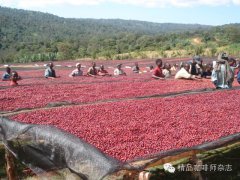Kenyan coffee-producing countries with rich conditions for growing coffee beans
The highest temperature of the year is 22: 26 ℃ and the lowest is 10: 14 ℃. These conditions are very suitable for the excellent growth of Arabica beans. And high-quality Arabica coffee beans, its suitable growth conditions are on the slopes of 900m ~ 2000 meters above sea level in the tropics, the suitable growth temperature is 15024 ℃, the higher humidity, the annual rainfall is not less than 1500 ml, the soil is fertile and acidic, the volcanic ash is very suitable, and there are appropriate sunshine and shade conditions. based on these characteristics, most of them are located in countries with alpine topography at the Tropic of Cancer. This generation is also known as the world coffee belt, and Kenya happens to be one of them, and the topographical and climatic conditions are very suitable for the growth of high-quality coffee.
Then after tracing back to the origin, it should be a variety. However, what kind of Kenyan AA is the Kenyan AA that I drink with a strong ripe fruit flavor and red wine flavor? What level does it belong to?
The answer is that although Kenya is bordered by Ethiopia, the ancient coffee country, it was not until the beginning of the 20th century that Kenya developed the coffee planting industry due to the intervention of British and French forces. Interestingly, Ethiopia is a natural ancient variety, without the help of variety screening and genetic engineering, and does not apply chemical fertilizers and pesticides. In Kenya, on the contrary, not only coffee varieties are selected or mixed-race improved varieties, but also chemical fertilizers, pesticides and sun-exposed inorganic planting methods. Unexpectedly, the taste spectrum of the coffee is not only not vulgar, but also very delicate, with bright and changeable acidity, good sweetness and thickness, and better cleanliness than other countries. This is mainly due to the outstanding variety screened and improved by Kenya: SL28/SL34, and the unique global double fermentation washing method.

Important Notice :
前街咖啡 FrontStreet Coffee has moved to new addredd:
FrontStreet Coffee Address: 315,Donghua East Road,GuangZhou
Tel:020 38364473
- Prev

Indonesia Bali Coffee Bean Introduction Kahayangan Manor Coffee Manor
Coffee beans are all elite. Second, Luwak's digestive juices break down the protein in the coffee beans into very small particles, which enhances the aroma of the coffee during grinding. In addition, Luwak's gut filters out certain proteins, reducing the bitter taste of coffee. The researchers say that the process of Kopi Luwak coffee beans passing through the stomach of civet cats is very similar to that of civets.
- Next

Cameroon coffee espresso deep roasted coffee beans coffee net
High-quality coffee beans are refined by water treatment. The coffee beans with less impurities can be obtained by the water washing method, but if the water quality and time are not properly controlled during the fermentation process, the coffee beans will easily be infected with the sour taste of excessive fermentation. and dry beans also need to pay attention to timely re-inspection to prevent coffee beans from being contaminated by wet ground and sundries. Processed
Related
- Does Rose Summer choose Blue, Green or Red? Detailed explanation of Rose Summer Coffee plots and Classification in Panamanian Jade Manor
- What is the difference between the origin, producing area, processing plant, cooperative and manor of coffee beans?
- How fine does the espresso powder fit? how to grind the espresso?
- Sca coffee roasting degree color card coffee roasting degree 8 roasting color values what do you mean?
- The practice of lattes: how to make lattes at home
- Introduction to Indonesian Fine Coffee beans-- Java Coffee producing area of Indonesian Arabica Coffee
- How much will the flavor of light and medium roasted rose summer be expressed? What baking level is rose summer suitable for?
- Introduction to the characteristics of washing, sun-drying or wet-planing coffee commonly used in Mantenin, Indonesia
- Price characteristics of Arabica Coffee Bean Starbucks introduction to Manning Coffee Bean Taste producing area Variety Manor
- What is the authentic Yega flavor? What are the flavor characteristics of the really excellent Yejasuffi coffee beans?

